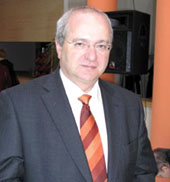Parliament ready to rewrite election code
By Shorena Labadze
Monday, June 30

The minority leader in parliament said last week that a group should be put together to recommend changes in Georgia’s election law. The proposal enjoys backing from the parliamentary speaker, who said the group could form by the end of the year.
Matyas Eorsi, the head of the Parliamentary Assembly of the Council of Europe’s election observation delegation to Georgia, advised against any delay.
“My current recommendation would be that the political forces start negotiations immediately, not directly before the next election,” he told Georgian television station Mze last week. “Debates on election law should be held in the parliament. If the political forces achieve a consensus, it will increase trust among the population.”
The parliamentary opposition is ready for just that, and wants international recommendations to be taken into account when drawing up changes to the law.
The amended election code used for last month’s parliamentary elections drew fire from the opposition for perceived imbalances which favored the government, including the system of electing MPs and briefer windows for submitting complaints.
Ruling party representatives say changes to the code were intended to address concerns raised by observers after the January presidential election.
In its preliminary report on the May parliamentary elections, an OSCE election observation mission agreed that the amendments took into account a number of its previous recommendations, but said “others remain unaddressed.”
The election law as it stands now is “generally conducive to the conduct of democratic elections” but includes a “number of new provisions that create unequal conditions in favor of the incumbents,” the report said, like allowing the use of administrative resources and campaigning by political officials.
Observers also chastised the government for the timing of the electoral reforms, which were passed unilaterally just weeks before the parliamentary elections, leaving opposition concerns unaddressed and some ambiguously-worded laws on the books.
Now, with plenty of time before the next elections, civil society campaigners say there is an opportunity to more carefully consider the next raft of changes. Along with ironing out minor wrinkles, some advocate major adjustments like strengthening local government.
“[Mayors] must be elected by the people,” said Zaal Anjaparidze, civil society program manager at the Eurasia Partnership Foundation. Mayors are currently elected from local councils, which are typically comprised of ruling party members.
Anjaparidze also singled out gaps in the law which allow perceived imbalances in the campaign environment.
“Most important is equal conditions for political parties, including the use of media resources. The current electoral code doesn’t regulate this, and it must be put in there,” he said.
The opposition Christian Democrats took up their seats in parliament after talks with the government on a set of reforms they would like to see; their sought-for electoral changes included directly electing mayors and a public referendum on the system for the next parliamentary elections.
“[The parliamentary group] will work on all the gaps which were identified by all international and local organizations during the…parliamentary elections,” Christian Democrat MP Levan Vepkhvadze said.
That effort will be complemented by local NGOs like the International Society for Fair Elections and Democracy, which last week began an exhaustive check of voter rolls throughout Georgia.
“We do this to identify and display the gaps of the May 21 elections. We’ll hand our results to the Central Election Commission and other organizations, including international ones,” a spokesperson for the group said. “Our key aim is for the next elections to be better than the previous one was.”
Before joining parliament, the Christian Democrats also said they would seek an investigation into election violations. MP Jondi Baghaturia, an opposition politician who defied a boycott to take his seat in parliament, has called for an investigation into the previous two elections, which the opposition claim were rigged, and the crackdown on anti-government protestors last November.
But the Christian Democrats seem to have put demands for an investigation on the backburner, and Baghaturia, who was left out of an opposition faction in parliament, does not have the legislative support he needs to formally start investigations.
